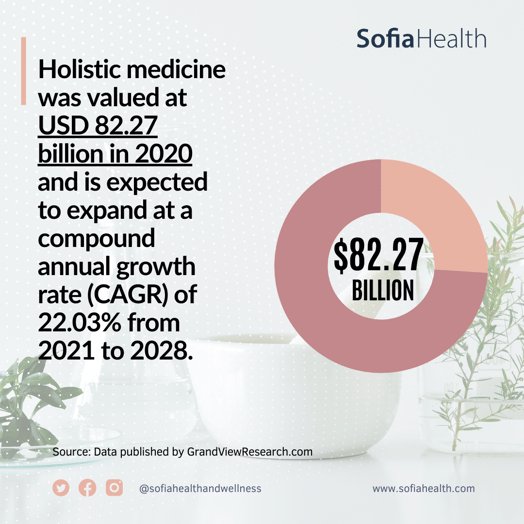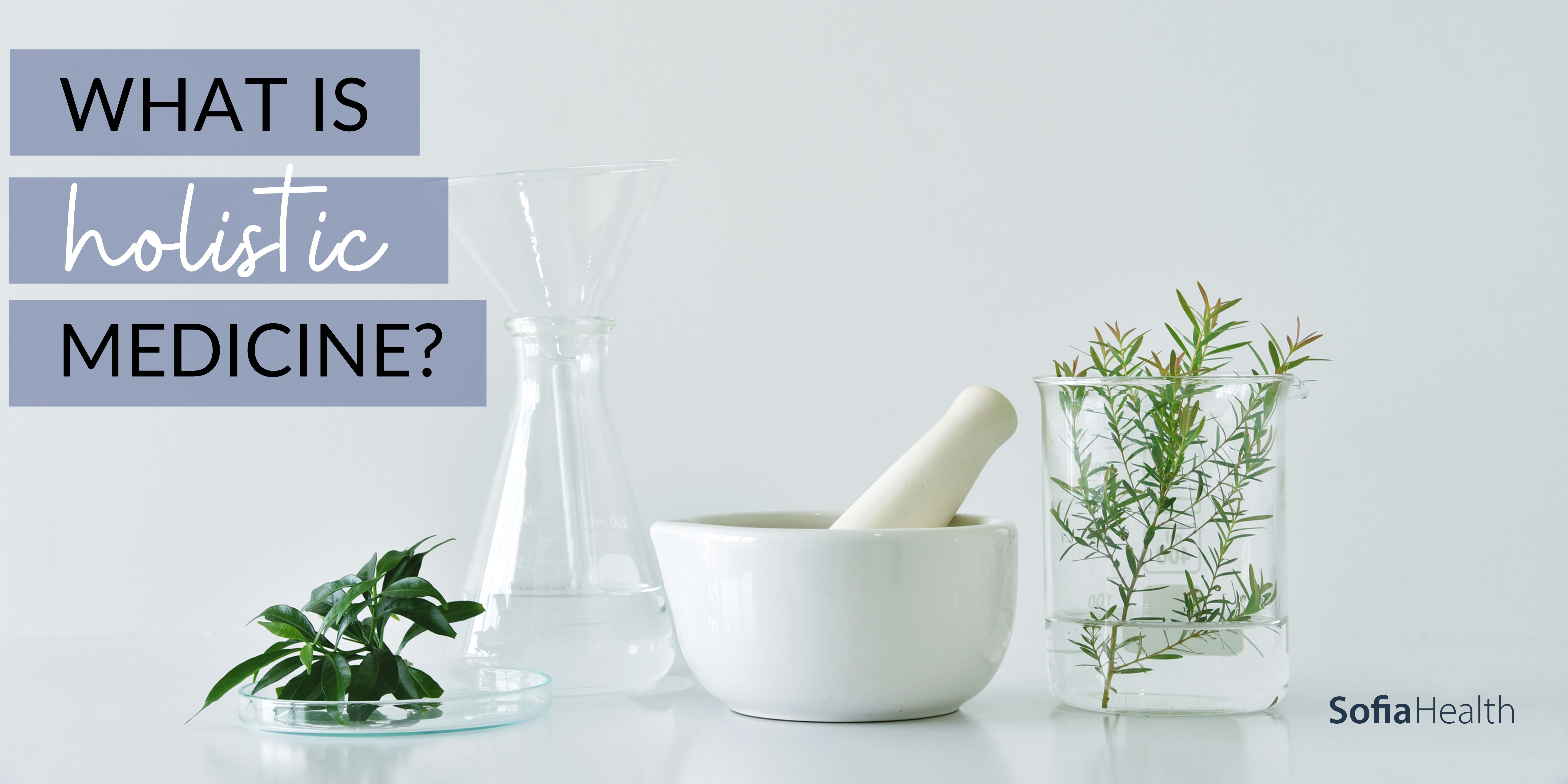In order to understand what holistic medicine means, you have to understand what holistic means. The philosophy of the word holistic is characterized by the comprehension of the parts of something as intimately interconnected and explicable only by reference to the whole (Oxford Dictionary).
Table of Content
What does a holistic doctor do that a traditional doctor doesn’t?Principles of Holistic Medicine.
Holistic Medicine: Types of Treatments
Benefits of a Holistic Approach
Where to Find a Holistic Medicine Provider
What is Holistic Medicine?
.png?width=524&name=What%20is%20Holistic%20Medicine%20(1).png)
When you talk about holistic medicine, sometimes called alternative medicine, you’re referring to the treatment of the whole person, taking into account mental and social factors, rather than just the symptoms of a disease. Altogether, holistic medicine focuses on the body, mind, and spirit.
Typically, holistic medicine combines traditional medicine with complementary and alternative medicine (CAM). CAM is the term for medical practices that aren’t part of standard medical care. However, holistic medicine isn’t meant to replace traditional medical care.
A good example is going to the doctor for a stomach ache or migraine. Holistic doctors will evaluate potential issues that could be causing you to experience these problems. Most people would typically walk out with a bottle of medicine and call it a day, but your holistic doctor will want to discuss any stressors or personal issues that might be affecting your well-being.
Does Holistic Medicine Work?
Though there are many skeptics, holistic medicine has continued to win over western medicine. Western medicine is when medical doctors and other healthcare professionals like nurses, pharmacists, and therapists, treat symptoms and diseases using drugs, radiation, or surgery (NCI Dictionaries).

Though we encourage the use of traditional medicine for more severe health problems such as heart disease, there have been studies that show how practitioners have drastically changed patients' lives with holistic medicine.
Intra-articular injection of the osteoarthritic knee.
A randomized study investigated whether or not diagnostic ultrasound would result in less pain for patients. They injected their knees with sonographic guidance which resulted in a 48% reduction in procedural pain, a 107% improvement in response rate, and a 36% increase in therapeutic duration.
Though this type of success story won’t happen to everyone, the majority of patients do report some sort of improvement in their condition whether it be less pain or reduced stress levels.
Principles of Holistic Medicine.
.png?width=524&name=What%20is%20Holistic%20Medicine%20(3).png)
Holistic medicine is based on a belief system. It believes that the most powerful healer is unconditional affection and the only person responsible for your wellbeing and health is yourself. Healing powers are inherent in every human being. You are a person, not your disease.
Healing yourself isn’t solely on you or your doctor. Both of you will work together to address all parts of your personal life while implementing both holistic and traditional medicine. Holistic medicine is used to identify the root cause and resolve your issues rather than temporarily fixing your symptoms.
The principle is prevention first, treatment second. One part of your body, not your whole body, causes your disease. A healthy body is a result of combining physical, emotional, mental, spiritual, and social aspects of one's life.
Here’s a list of other principles of holistic medicine:
- Optimal Health.
- Healing Power of Love.
- View people as a unity of Mind, Body, and Spirit.
- Prevention of Illness.
- Raise disease awareness by managing symptoms.
- Innate Healing Power.
- Integration of Traditional and Holistic Medicine.
- Practitioner and Patient Relationship Partnership.
- Every Patient is Unique.
- Teaching by Example.
What does a holistic doctor do that a traditional doctor doesn’t?
The conventional medical system is becoming increasingly complex. In just a yearly checkup, you'll have a laundry list of specialists to handle every issue. Costs may increase, and if you have preexisting conditions, you might need a subspecialist who is solely dedicated to treating that condition.
It's not a bad thing, but it's always a good idea to explore different options, such as holistic doctors. What is the difference between a traditional doctor's practice and a holistic doctor's practice? Traditional doctors are healthcare professionals who practice conventional medicine. They have a medical degree and specialize in a particular field, such as cardiology or orthopedics. When you have several conditions that need to be addressed, traditional doctors will work together to control your symptoms. The traditional medical approach is reactive rather than preventative.
When it comes to consulting a holistic doctor, most people hesitate. However, holistic doctors also hold medical degrees and are licensed to practice medicine. The only difference is that holistic practitioners use a preventative, whole-body approach by combining complementary and alternative medicine. Before treating the symptoms, they assess you as a whole. Holistic doctors bridge the gap between traditional treatment and alternative treatment.
Holistic Medicine: Types of Treatments
.png?width=524&name=What%20is%20Holistic%20Medicine%20(4).png)
There are three different types of treatments for holistic medicines. However, these three different types of treatments have many subcategories.
Educational
The goal for educational holistic medicine is to teach the patient different lifestyle changes and provide you with self-care techniques. Some of these treatments include:
- Nutrition counseling
- psychotherapy
- Diet supplements
- Relationship and spiritual counseling
- Exercise
- Yoga
- Stretching
- Tai chi
- Meditation
- Self-massage
- Support groups
These treatments reduce your stress and anxiety. Eating healthier and moving your body will naturally release any pent-up energy you have. It’ll also improve your emotional and physical health. You’ll strengthen your self-awareness and in the process, you’ll improve your self-esteem as well.
Complementary and alternative therapies
Your holistic doctor might perform these themselves or refer you to someone that can. Those services include:
- Acupuncture
- Used to relieve discomfort associated with diseases or conditions.
- Chiropractic Care
- Treatment for the mechanical disorder of the musculoskeletal system. - Homeopathy
- The body can cure itself. - Reiki
- Energy healing. - Naturopathy
- Uses herbal medicines and believes in self-healing, non-invasive practices. - Massage therapy
- Music therapy
- Aromatherapy
- Hypnosis
Western Treatments.
These western treatments are more traditional and commonly seen. However, holistic doctors use these therapies in combination with the ones listed above. Here are the most common:
- Surgery
- Chemotherapy
- Type of cancer treatment using one or more anti-cancer drugs. - Radiation therapy
- Type of cancer treatment used to kill or control malignant cells using ionizing radiation. - Prescription medications
Benefits of a Holistic Approach
There are many different mental and physical health factors to take into consideration when evaluating the benefits of holistic medicine. You have to take a look beyond the patient’s presenting symptoms to see that solving their one problem wasn’t the only benefit they gained.
Once you’ve decided to seek out a holistic professional, you’ll notice that your habits will improve. They’ll give you many tips and tricks to make lifestyle changes for the better, resulting in a stronger mind and body. Once your body overcomes disease once, it’ll be more likely to bounce back the second time.
With that being said, your lifestyle changes and other holistic medicines can prevent various diseases and disorders from appearing. Your stress levels won’t be as bad and so will your anxiety levels because you now have tools to help you through an episode.
The overall benefit is a happier outlook on life and a drive to make your life the one you want to live.
It’s important to note that when something says it’s “natural” it does not necessarily mean it’s safe. While taking herbal remedies and vitamins are good for you, it’s always better to be safe and ask your doctor if you can take them. With that being said, holistic medicine is safe.
Holistic medicine is safest when recommended by a certified medical doctor and under their care and supervision. Most people tend to just google a remedy and self-medicate. While that may work, it’s still important to double-check with a professional in case you’re mixing remedies you shouldn’t be.
Delaying any kind of care with self-medicated methods alone can be dangerous. The safest and most responsible solution to avoiding this is working with a holistic doctor. Our certified holistic practitioners have all the expertise you need to use holistic medicine safely.
Where to Find a Holistic Medicine Provider
SofiaHealth.com provides you with a variety of holistic coaches and certified practitioners. Ranging from health and nutrition practitioners to reiki teachers who will consult you about energy healing. Yoga classes and even aromatherapy services are provided on our website.



.png)


